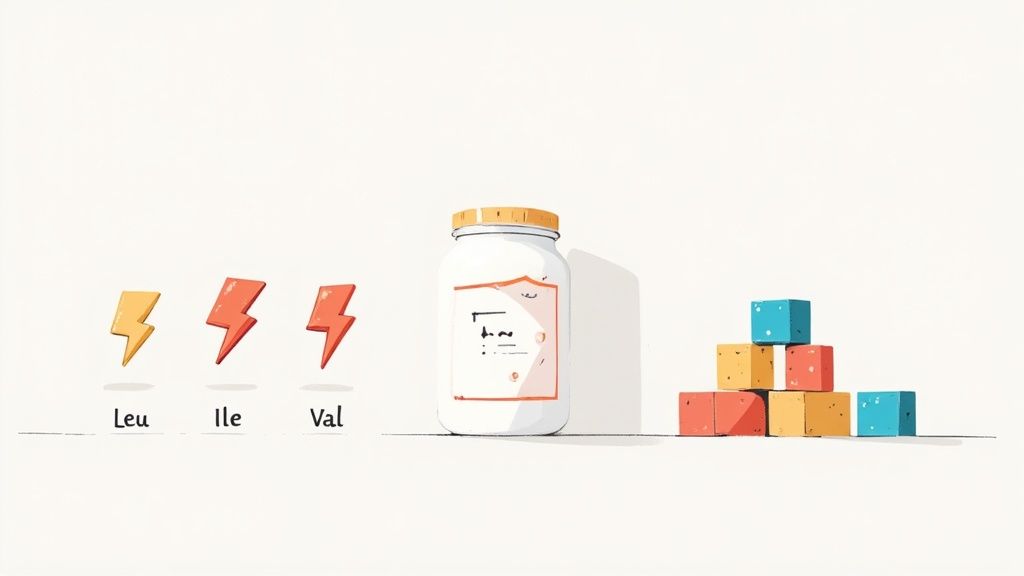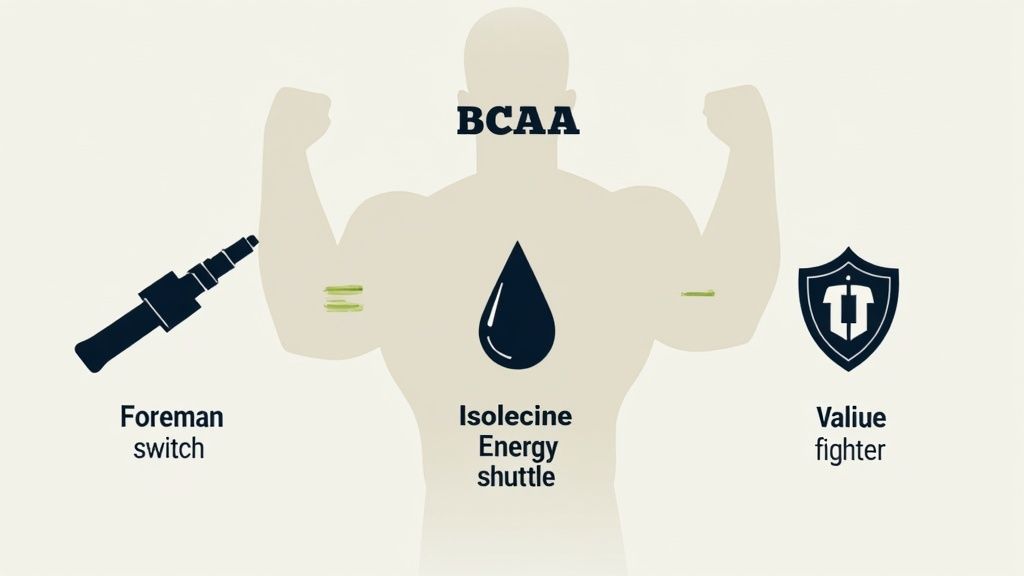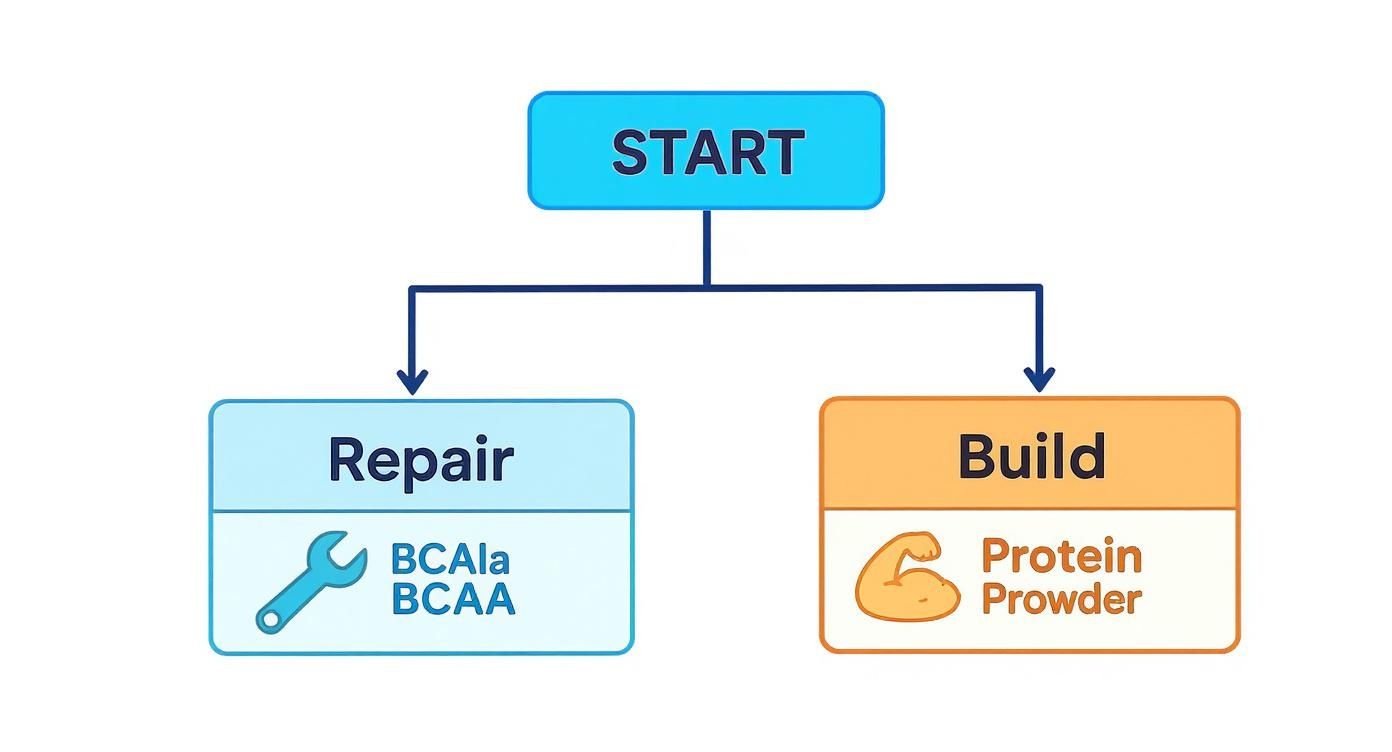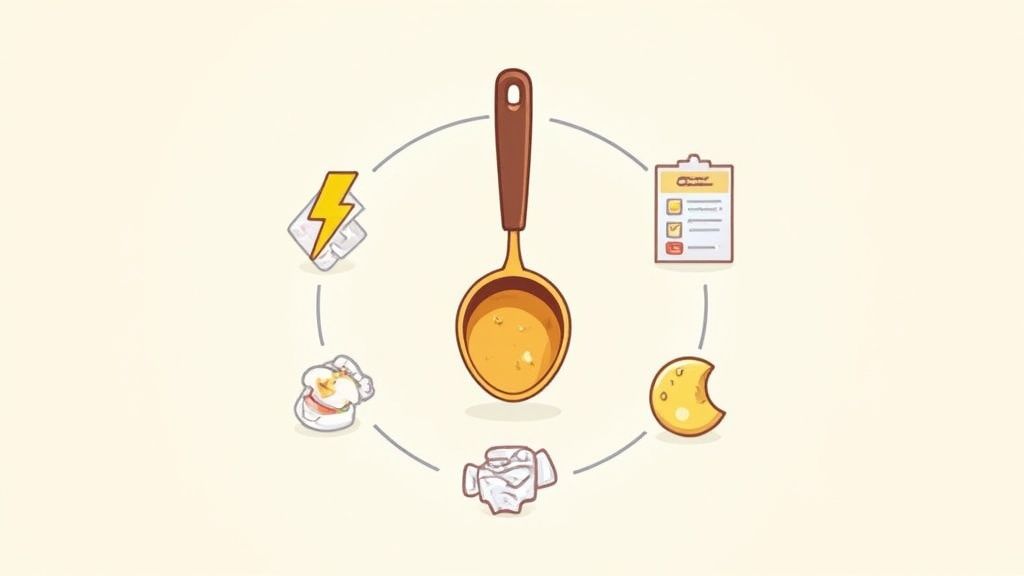BCAA vs Protein Powder The Ultimate Showdown
Posted by Maximus
on
Walk into any supplement shop, and you'll see the two heavyweights staring each other down from opposite shelves: BCAA vs protein powder. The core of the debate is actually pretty simple. Protein powder gives you the complete toolbox for muscle growth, while BCAAs are more like a specialized, rapid-response team of just three key players.
Imagine you're building a house. Protein powder is the entire construction crew—the framers, the roofers, the electricians—everyone you need for the whole project. BCAAs? They're the elite three-person crew that shows up instantly to patch a hole in the roof during a storm, preventing further damage.

So, let the showdown begin! In this corner, we have the precision specialists: Branched-Chain Amino Acids (BCAAs). And in the other, the foundational powerhouse: Protein Powder. If you've spent any time in a gym, you've heard the locker room chatter and seen the competing tubs. It's time to figure out what the real score is.
Let's cut right through the marketing hype. The truth? It’s not about which one is "better." It's about picking the right tool for the right job at the right time. Figuring out their unique roles is the secret to unlocking your real potential.
Before we get into the nitty-gritty, here's a quick side-by-side to get you started. This table lays out the fundamental differences between the specialized BCAA team and the all-in-one protein powder army.
| Attribute | BCAAs (Branched-Chain Amino Acids) | Protein Powder (e.g., Whey, Casein) |
|---|---|---|
| Composition | Contains only 3 essential amino acids: Leucine, Isoleucine, and Valine. | Provides all 9 essential amino acids, making it a "complete" protein source. |
| Primary Goal | Muscle preservation, reducing fatigue during workouts, and kickstarting recovery. | Overall muscle repair, growth, and meeting daily protein intake goals. |
| Digestion Speed | Extremely fast. Bypasses the liver and goes directly to the muscles. | Varies from fast (whey isolate) to slow (casein), but generally slower than BCAAs. |
| Best Use Case | Intra-workout (during training), fasted cardio, or between meals to prevent breakdown. | Post-workout recovery, meal replacement, or supplementing daily protein intake. |
| Caloric Content | Typically very low to zero calories. | Contains calories, usually around 100-150 per scoop. |
This table gives you a great snapshot, but remember that supplements are just one piece of the puzzle. Understanding the broader role of supplements alongside exercise is crucial for building a fitness plan that actually works.
The market size for these products tells a story, too. The BCAA market was valued at $1.8 billion in 2023, a respectable figure. But the global protein powder market? It clocked in at over $20 billion, highlighting just how many people rely on complete protein sources for their fitness goals.

Alright, let's talk about the three amigos of muscle maintenance: Leucine, Isoleucine, and Valine. These guys aren't just any old amino acids. Think of them as the special forces unit in your nutritional arsenal, known collectively as Branched-Chain Amino Acids, or BCAAs.
So, what makes them so special? It's all about the express lane. Unlike most other amino acids that have to get processed by your liver first, BCAAs get a VIP pass straight to your muscles. This means they get to work almost instantly.
This rapid-fire delivery system is exactly why BCAAs have built a reputation as the ultimate intra-workout heroes. They're on the scene providing fuel and protection right when your muscles are crying out for help.
Imagine them as a highly skilled construction crew for your muscles, where each member has a very specific job.
Leucine: The Foreman. This is the undisputed MVP. Leucine is the spark that ignites muscle protein synthesis (MPS)—the process of actually building new muscle. It’s the one that flips the "on" switch for growth and repair.
Isoleucine: The Energy Manager. When your workout starts to feel like a grind, Isoleucine jumps in. It helps your body shuttle glucose into your muscle cells, giving you a direct source of fuel to power through those last few grueling reps.
Valine: The Fatigue Fighter. Ever feel that mental fog roll in mid-session? That's where Valine comes in. It battles tryptophan (the amino acid that makes you feel sleepy) for entry into the brain, helping you stay sharp and push harder for longer.
Their unique ability to bypass the liver and get straight to work in the muscles is what truly sets BCAAs apart. This direct pathway means they can reduce muscle breakdown and combat fatigue during your actual workout, not just afterward.
This direct-to-muscle action is the secret sauce. When you’re in the middle of a brutal leg day or a long run, your body starts to break down muscle tissue for energy—a process called catabolism. Sipping on BCAAs gives your body an alternative fuel source, essentially telling it, "Hey, burn these instead of my hard-earned gains!"
This anti-catabolic shield is a game-changer, especially if you're training on an empty stomach or cutting calories. Understanding the science behind amino acids for muscle recovery can seriously level up your strategy for preserving lean muscle.
But while BCAAs are the repair specialists, they aren't the entire construction company. Next up, we’ll meet the powerhouse that brings all the building materials to the job site: protein powder.
If BCAAs are the specialized three-man framing crew, then protein powder is the entire construction project. It’s the architectural plans, the truckloads of raw materials, and the full union-certified workforce all showing up to build some serious muscle. This is where the whole BCAA vs. protein powder debate really heats up, because protein powder gives you the whole picture.
A single scoop of a quality protein powder, like whey or casein, doesn't just hand you the three BCAAs. It delivers all nine essential amino acids (EAAs). These are the non-negotiable building blocks your body can't make on its own and absolutely, positively needs for growth.
Trying to build muscle with only BCAAs is like trying to build a house with just that framing crew. Sure, the skeleton of the house goes up, which looks promising. But you still need the electricians, the plumbers, and the roofers (the other six EAAs) to actually make it a functional, livable structure.
A complete protein source is non-negotiable for anyone serious about building lean muscle. It provides every single raw material your body requires to not only repair damaged tissue but to construct new, stronger muscle fibers from the ground up.
The market numbers really drive this point home. While the global BCAA supplements market is nothing to sneeze at, projected to hit $253.9 million by 2025, it’s absolutely dwarfed by the protein powder market. That one pulls in sales over $10 billion every single year. This massive gap shows just how dominant protein powder is, thanks to its broader appeal for both hardcore athletes and general wellness folks.
This full-spectrum approach is precisely why protein powder is considered one of the best muscle-building supplements you can spend your money on. It’s not just about patching things up after a tough workout; it’s about giving your body a sustained supply of everything it needs for real, lasting growth.
Different protein types also give you some cool strategic advantages. For instance:
Going a step further, it's worth getting familiar with the differences between plant-based vs. animal protein powders. No matter which you choose, the core principle is the same: a complete amino acid profile is the absolute foundation of effective muscle building. Without it, you're just leaving gains on the table.
Alright, let's cut right to the chase. You can forget all the boring pro/con lists you’ve seen a hundred times before. We're about to throw BCAAs and protein powder into the ring for a real showdown, focusing on the stuff that actually impacts your results. Welcome to the main event in the BCAA vs protein powder debate.
This isn't about crowning one undisputed champ for everyone. It's about giving you the inside scoop so you can pick the right tool for your specific mission. Let’s break it down, round by round.
Think of this as a drag race. The light turns green, and BCAAs slam on the gas, leaving protein powder in a cloud of dust. Because they're "free-form," they get to bypass the liver and get absorbed almost instantly, heading straight for your muscles.
Protein powder, even a fast-acting whey, is more like a powerful but much heavier muscle car. It’s got horsepower, sure, but it needs to be fully digested and broken down first. That just takes time.
Now for the big one: actually building new muscle. The leucine in BCAAs is like the spark plug that ignites the engine for muscle protein synthesis (MPS). It’s the initial signal that tells your body, "Okay, time to build!"
But here's the catch. Protein powder shows up with the entire construction crew and a fleet of trucks loaded with materials. It doesn't just provide the spark; it delivers all nine essential amino acids needed to keep that construction project going long after the initial BCAA signal has faded.
BCAAs start the muscle-building party, but protein powder keeps it going all night long. Without all the essential amino acids from a complete protein source, the building process stalls out pretty quick.
This round is a huge deal for anyone on a cut or following a strict diet. When you're trying to shed fat, the goal is to hang on to every ounce of hard-earned muscle, and that means every single calorie counts.
BCAAs are the ultimate secret weapon here. They are typically zero-calorie, which means you can protect your muscles from being cannibalized for fuel during fasted cardio or an intense session without adding a single thing to your daily intake.
Protein powder, on the other hand, always brings calories to the table—usually somewhere around 100-150 per scoop. While fantastic for hitting your protein goals and fueling recovery, you absolutely have to account for those calories in your daily budget.
When you zoom out and look at the bigger picture, the story changes completely. BCAAs are specialists. They deliver just three amino acids, doing one specific job, and they do it exceptionally well.
Protein powder, however, is the multi-tool of the supplement world. It gives you a complete amino acid profile and often includes other goodies like calcium. This comprehensive nutritional punch supports not just muscle growth but your overall health and recovery. The market size tells the same story; the global protein supplements market was valued at over $20 billion in 2023, while the BCAA market is on track to hit a more specialized $4.2 billion by 2033. You can discover more about these market trends and their drivers to see the full picture.
To make your choice even simpler, this decision tree nails down which supplement to grab based on your main goal.

The visual makes it crystal clear: use BCAAs for tactical repair and preservation, but rely on protein powder for the foundational work of building and growth.
Alright, let's cut through the theory and talk about when you should actually grab the BCAAs instead of the big tub of protein. This is where BCAAs go from being just another supplement to your secret weapon for specific situations.
Think of it like this: protein is your full-course meal, but BCAAs are your precision-targeted espresso shot. You don't need them all the time, but when you do, they work wonders. Here's when they really shine.
This is the classic case for BCAAs. If you're the type to roll out of bed and head straight to the gym, your body is in a prime state to start breaking down muscle for fuel. Not exactly what we're going for.
Sipping on BCAAs before or during your fasted session gives your body a quick, calorie-free energy source. It essentially tells your muscles, "Hey, burn this stuff instead of yourselves!" This helps protect your hard-earned gains without kicking you out of a fasted state.
We've all been there. You're deep into a killer leg day or a marathon run, and you hit a wall. Your body is screaming, and your mind is getting foggy. This is where the "V" in BCAA, Valine, becomes your best friend.
Valine competes with tryptophan—the amino acid famous for making you feel sleepy—for a spot in your brain. By blocking some of that tryptophan, Valine helps fight off that "I'm so done" feeling, keeping you sharp and focused enough to crush those last few reps.
Cutting calories to get lean is a delicate balancing act. The goal is to drop fat, not the muscle you've spent months building. With calories being so precious, a full protein shake isn't always the right move.
BCAAs are a lifesaver here. They're practically calorie-free and act as a powerful anti-catabolic shield for your muscles. Taking them around your workout or between meals sends a signal to your body to spare muscle tissue, which is especially critical when your energy intake is low. And remember, smart supplementation is a big part of recovery; check out our guide on how to reduce muscle soreness for more tips to keep you going strong.
You know that feeling? It’s been a few hours since lunch, but dinner is still a couple of hours away. You start feeling that little dip in energy, and you just know your body is getting hungry for some amino acids.
A quick scoop of BCAAs is the perfect bridge. It floods your muscles with exactly what they need, instantly stopping any potential muscle breakdown without the calories or digestive load of a shake or a snack. It's the ultimate holding pattern for your muscles. If these situations sound all too familiar, the BCAA formula we've perfected here at Crazy Muscle is designed to protect your gains when it matters most.

Alright, let's talk about the OG of muscle-building supplements. If BCAAs are the specialized surgical tool, protein powder is the entire construction crew with all the heavy machinery. It’s the bedrock of building serious, undeniable muscle.
Honestly, the whole BCAA vs. protein powder debate often comes to a screeching halt right here. Why? Because getting enough complete protein is absolutely non-negotiable. Here’s when reaching for that shaker cup is your smartest play.
You’ve just finished a brutal session. Your muscles are screaming, completely drained and desperately looking for raw materials to start repairing themselves. This is the moment a fast-digesting whey protein shake truly shines.
Downing a shake within an hour or so of that last rep sends a flood of all nine essential amino acids straight to your muscles. It’s not just about flipping the switch on muscle protein synthesis; it’s about giving your body every single brick it needs to rebuild bigger and stronger.
Let’s be honest for a second. Chewing through plate after plate of chicken and fish every single day can get real old, real fast. Trying to hit that magic number—often around 1.6 grams per kilogram of body weight for anyone training hard—is a serious challenge with whole foods alone.
This is where you just can't beat the convenience of protein powder. A quick shake is by far the easiest way to cram an extra 25-30 grams of top-tier protein into your day, guaranteeing your muscles are never left waiting for what they need to grow.
Protein powder isn't just a recovery drink; it's a tool for consistency. It plugs the gaps your diet leaves open, making damn sure all that effort in the gym doesn't go to waste.
Life gets chaotic. Sometimes, sitting down for a proper, protein-packed meal just isn’t in the cards. A shake can be a lifesaver, serving as a satisfying snack or meal replacement that keeps your goals on track without sending your diet off the rails.
And for a next-level trick? Try a slow-digesting casein protein before hitting the sack. It acts like a seven-to-eight-hour IV drip of amino acids for your muscles while you sleep. This creates an anti-catabolic shield, fueling repair and recovery all night long.
Ready to give your muscles the complete fuel source they’re crying out for? Check out our top-rated protein powders on Amazon and start building with the right blocks.
Let's be real, the world of supplements can feel like you need a science degree just to read the labels. So, let's cut through the noise and get straight to what you really want to know about BCAAs and protein powder.
You bet. In fact, it's a powerhouse strategy if you time it right. Think of it as a one-two punch for muscle growth and recovery.
Lots of serious lifters will sip on BCAAs during their workout. This gives their muscles a direct line of fast-acting fuel and helps fend off that mid-session muscle breakdown. Then, they'll knock back a protein shake after the last rep to kickstart the full-scale repair process with all the necessary building blocks.
The only rule? Don't dump them into the same shaker cup and drink them at the same time. That's just redundant, since your protein powder already has BCAAs in it. The magic is in the timing.
Honestly, for most folks just looking to build some muscle and stay fit, a solid protein powder is all you need. It’s got you covered.
But BCAAs become a secret weapon in a few specific situations. Are you hitting the gym for fasted cardio first thing in the morning? Are you deep in a cut and trying to hang onto every ounce of muscle? Or maybe you're tackling an absolutely brutal, marathon-length training session. In those cases, the quick, nearly calorie-free energy from BCAAs is your best friend for preserving muscle and pushing through fatigue.
Think of it like this: Protein is your comprehensive insurance plan for daily growth. BCAAs are the special forces you call in for the really tough missions.
This is a great question, and the answer is... both are awesome for getting lean! They just work a little differently.
BCAAs are a dieter's dream because they’re practically calorie-free. This means you can protect your hard-earned muscle from being used as fuel when you're in a calorie deficit, all without adding to your daily intake.
Protein powder, on the other hand, is your best friend for crushing hunger. A good shake keeps you feeling full and satisfied, making it way easier to stick to your diet. Plus, it helps you maintain that metabolism-revving muscle mass. The best choice really boils down to your specific diet and workout routine.
No matter which path you take, consistency and quality are what will get you results. The entire lineup at Crazy Muscle is built to give your body the high-octane fuel it needs to perform, recover, and grow—without any of the junk. Explore our full range of muscle-building essentials on Amazon and find the right fuel to light your fire.